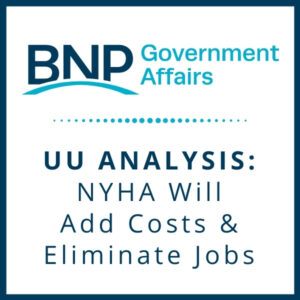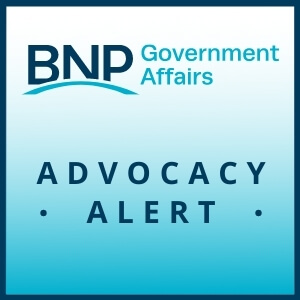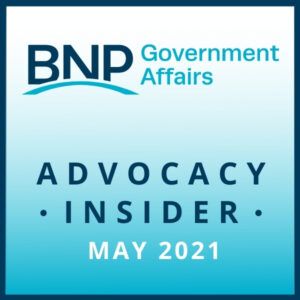2022 Albany Preview: 11 Issues We’re Watching
Blog Categories
January 4, 2022
On January 5, state legislators convened in Albany (or, on Zoom) to kick off the 2022 legislative session. All eyes are on Kathy Hochul as she navigates her first session as Governor and jockeys for position in the June gubernatorial primary race. Here are eleven issues we are watching as the session begins:
- COVID-19 Response. New York is currently seeing record COVID case numbers despite 83% of NY adults being fully vaccinated. As state and local leaders plan new ways to mitigate the virus, the BNP is focused on making sure our region stays open for business. The BNP supports measures like making more at-home and rapid testing available, but governmental efforts should not close down our economy as they did in 2020.
- Workforce Crisis. Employers across the state are struggling to attract and retain qualified talent, and BNP members cite it as their #1 concern. The BNP will be tracking what action the Governor and Legislature take to address our state’s workforce issues.
- Unemployment Insurance Stabilization. To finance its UI fund during the pandemic, the state took a $9 billion loan from the federal government. Now, employers are facing UI rate hikes to pay that loan back. The BNP has suggested solutions to our leaders for months, and we are closely monitoring whether the state will act to protect employers from increases.
- Climate Policy. The Climate Action Council is finalizing policy recommendations that will put NYS on track to hit the emission goals of the Climate Leadership and Community Protection Act. The BNP has weighed in on these recommendations and will be closely tracking them. Since the federal “Build Back Better Act” has stalled in Congress, there is a renewed push in Albany for more aggressive climate legislation, such as the Climate and Community Investment Act, which would add taxes on numerous fuel sources.
- Infrastructure Investment. Since Congress passed the bipartisan Infrastructure Investment and Jobs Act, significant financial resources are now available to pursue needed infrastructure projects. The BNP will be asking Albany to ensure funding parity between upstate and downstate, and has made policy suggestions on how removing red tape can maximize this investment. The BNP will also be in discussions with local leaders so that priority projects are funded.
- Single Payer Healthcare. Asm. Richard Gottfried, who first introduced the NY Health Act in 1992, recently announced he will retire at the end of the year. His impending retirement has generated new momentum behind his single payer healthcare legislation as a parting gift. Majorities in the Senate and Assembly already cosponsor the bill.
- Brownfield Renewal. The Brownfield Cleanup Program has been essential in redeveloping our region. However, the program is set to expire in 2022. The BNP has urged leaders to renew the program.
- Good Cause Eviction. Governor Hochul’s first legislative action was to extend the pandemic eviction moratorium through January 15. Once that expires, there will be a vocal push for the Good Cause Eviction legislation, which heavily regulates evictions and rent increases.
- Farmworker Overtime Threshold. The 2019 Farm Laborer Fair Labor Practices Act requires that farmworkers be paid an overtime rate when working beyond 60 hours in a week. Now, the Department of Labor is considering lowering the threshold to 40 hours per week, which would dramatically change the economics of the agriculture industry, one of New York State’s largest.
- Stadium Negotiations. The Buffalo Bills are looking for financial support from New York State and Erie County to construct a new stadium. A healthy public-private partnership can make this goal a reality and keep the Bills in Buffalo for another generation.
- Extended Producer Responsibility Act. An Albany proposal would shift the financial burden of recycling packaging material from municipalities to the companies that produce them. This bill would discourage manufacturing in New York and raise the cost of living after a difficult year of inflation.
Governor Hochul will hold her first State of the State Address on Wednesday, January 5, where she will roll out more of her goals for this year. Her Executive Budget proposal is expected shortly after.
To learn more about the BNP’s advocacy plans for this year, review our 2022 Advocacy Agenda here.
Related Posts
5.17.21 COVID-19 Bulletin: Cuomo Lifts Mask Mandate for Vaccinated New Yorkers
Starting this Wednesday, May 19, 2021, fully vaccinated New Yorkers no longer need to wear a mask or face covering outdoors and in most indoor settings.
UU Analysis: NYHA Will Add Costs, Eliminate Jobs
Upstate United, a BNP partner organization and non-partisan, pro-taxpayer, pro-economic growth, and pro-Upstate education advocacy coalition, recently analyzed the research on the potential economic impact of the New York Health Act (NYHA).
5.7.21 BNP Advocacy Alert – Extended Producer Responsibility Act Too Costly for New York
For weeks, the Buffalo Niagara Partnership has sounded the alarm on S. 1185, known as the Extended Producer Responsibility Act. This bill would broadly shift the responsibility of recycling packaging material (carton, glass, metal), paper and plastic products from municipalities to businesses, which the BNP suspected would add exorbitant costs onto businesses and consumers.
BNP Advocacy Insider – May 2021
The May 2021 Advocacy Insider is a roundup of important issues we are monitoring that could you and your business.



